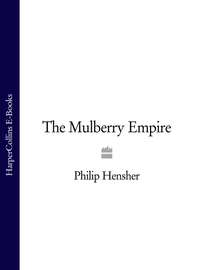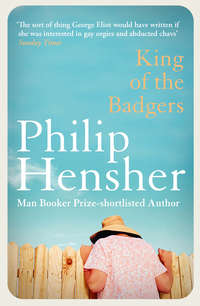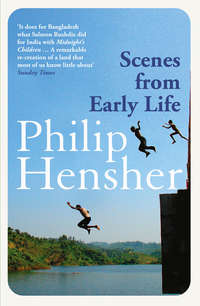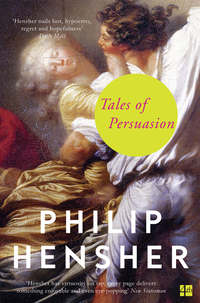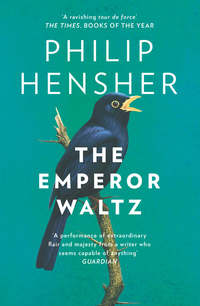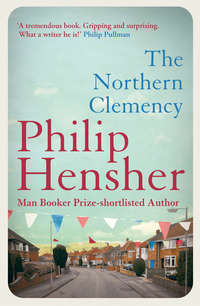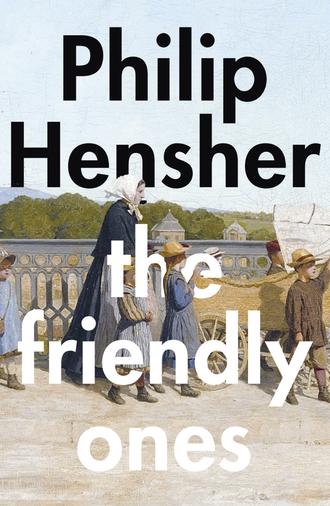
Полная версия
The Friendly Ones
People came round all the time. When the doorbell went in the middle of a rising roar from the television, Leo could almost see Hugh rising grumpily to open the front door to let Pete in, most often, or Melanie, or Sue, or Carol, or perhaps even Simon Curtis or Nick Cromwell. Sometimes when the ancients came back from work, there was a party going on in the back garden, Pete declaiming from the top of the rockery to the bewildered Tillotsons next door. But now the figure that came through the kitchen door behind Leo was six and a half feet tall.
‘I thought I’d come round,’ Tom Dick said, seating himself on the low brick wall round the flowerbed. ‘I wasn’t far anyway.’
‘Where do you live?’ Leo said.
‘Nearby,’ Tom Dick said. ‘Is that your brother and sister watching the middle-distance races?’
‘That’s the first thing I’m glad never to have to do again now I’ve left school.’
‘What, the middle-distance races?’
‘No, sport,’ Leo said.
‘Oh, sport,’ Tom Dick said. ‘Is that what you’re having to read?’
‘Do you want something to drink?’ Leo said.
‘Yeah, that’d be – just some squash,’ Tom Dick said. Leo went inside and made it. From the kitchen window, he could see Tom Dick, unobserved, turning and looking in an inquisitive way at the flowers. He tore off a leaf from the hydrangea then another; placed them together and lifted them up towards the sun. He tore them carefully, once, twice, three, four times, then separated them and compared, it seemed, the rips. All the time his feet were jogging on the spot. It was so hot, and Tom Dick was wearing a flannel tartan shirt and jeans and what looked like his school shoes. Leo had been wearing shorts for six weeks now, and nothing else; his legs and chest were as deep a brown as they would ever go. He watched Tom Dick, his pale face wincing against the sun, holding the leaves up.
‘How are you getting there?’ Tom Dick said. ‘To Oxford.’
‘My mum and dad are driving me,’ Leo said, surprised.
‘Oh – yes – mine too,’ Tom Dick said. ‘I passed my test last week.’
‘Congratulations,’ Leo said.
‘But they’ve still got to drive me down,’ Tom Dick said. ‘They’ve got to drive the car back or it would be stuck in Oxford.’
‘I’m taking my test next month,’ Leo said.
‘It’s brilliant, being able to drive,’ Tom Dick said. ‘I went out yesterday, drove all the way to Bakewell with the windows open.’
Quite abruptly, Tom Dick stopped, raised his hands in bafflement. For the first time he was going to talk to Leo, and then he had remembered something, three sentences in, and stopped himself. In a few minutes, Tom Dick had said something about it being nice to see Leo, that he’d see him in Oxford, he supposed, that he had to make a move. He finished the squash in one; he held the glass awkwardly; set it down on the ground. His mother must have said that he ought to go and see the boy who was going to the same college as him.
‘Who the hell was that?’ Hugh shouted from the sitting room, the little prodigy. Someone was throwing themselves over hurdles, or chucking a javelin, or something; Lavinia was clapping her hands in breathless excitement. Quite at once it came to Leo that Tom Dick had told him a lie; he had said that his mother and father were going to drive him down to Oxford, but that could not be true. Tom Dick lived with his mother alone, Leo remembered. His parents had divorced, years ago. His father lived in Scotland. If he thought about it, he could remember Tom Dick saying, ‘J’habite avec ma mère, à Fulwood, mais mon père habite Édimbourg d’habitude.’ It was clever of him to know that the French had a word of their own for Edinburgh. Leo wouldn’t have.
The ancients drove him. The brown Saab was OK, Leo felt. It was the car of a respectable GP, antique but workable. No one was going to sneer at it. And the ancients, too, they had made a fist of it, not dressing in a ridiculous way in suit and tie, like some people’s parents, not just turning up in what they’d wear to garden in. (They’d known and, after all, Leo had been fretting about whether to instruct Daddy in particular to wear a tweed jacket at the very least. They’d known about university and what Leo would be thinking about the people who brought him.) He’d been given a room in the main part of the college – not on the ground floor, like Charles Ryder in Brideshead Revisited, but under the eaves. His name was painted on the board on the ground floor, and again on the board by his door. The second year who had been assigned to show them the room formed a smiling bond with Hilary, who knew all about it.
‘Isn’t it just – lovely?’ Mummy said, looking out of the window.
‘That’s obviously the most important thing,’ Daddy said. ‘That you study somewhere Mummy thinks is lovely. Of course Cambridge would be lovelier, according to Mummy.’
‘I wish your father would …’ Mummy said. But she wasn’t quite clear of what she wanted. Hilary was going to goad her, of course, and comment on her saying that the college ought to be lovely where her favourite son was going to study. All the same, he was pleased, today, too. The row – the proper, full-scale row – could take place on the way home when Leo would know nothing about it, never hear until Christmas that Daddy had seriously threatened to abandon Mummy in the car park of a service station in the middle of nowhere.
‘Isn’t that – what was his name? That very tall boy? Wasn’t he at school with you?’ Hilary was looking down at the quadrangle. ‘What’s he doing here? Look at him, doesn’t he look a complete package? He looks so serious, the way he’s standing. Do you think he had to bend down to get through all these tiny medieval doors? I’d like to see that.’
‘He got in,’ Leo said. He came over. Tom Dick was there with an anxious, small woman in a piecrust-collared blouse and an aquamarine suit. Tom Dick was wearing what he had worn when he’d come round, a tartan shirt and a pair of jeans with, now, school plimsolls. His mother had dressed up. She was only five feet two or three at most; they made a conspicuous pair. They were carrying a cardboard box each; the mother was limping somewhat.
‘Oh, that’s nice,’ his mother said. ‘Having someone here you know the first day. He’s a nice boy. Isn’t he?’
‘I don’t remember hearing anything about anyone else getting in at all,’ Hilary said. ‘Is that it, then? Do you know where to go? You don’t want us to unpack everything and put your books on shelves in alphabetical order, I don’t suppose. Ce – stop staring out of the window. Leave Leo to what he’s got to do. I’ll treat you to a cup of tea in an Oxford teashop if you play your cards right.’
Then they were gone. Leo almost congratulated himself – he had come quite close, he felt, to having an argument with his father, and had walked away from it in a grown-up manner. That was the thing to do. Leo was to reflect – not then, but at some point weeks later, when everything had gone wrong – that he had spent almost every day of his life with his mother and father. You could probably count the days he had seen neither, and the number would be less than fifty. It hadn’t appeared to be an important moment, their going just at that point, leaving him in a sculptural landscape of brown cardboard boxes and a cheese plant balanced on top, like a De Chirico interior. What had happened was a strange thing, the sudden vision of his parents as if they were complete strangers, as anyone would see them, his father warm and jocular, taking his mother’s hand in a courtly way as they left. They had flung themselves into the world again; Leo had been delivered to this place and had shut the door. For a few moments he could hear the click of his mother’s footsteps as she went briskly down the wooden staircase, and even something that might have been a word or two, exchanged bravely, a little laugh. He was, at that moment, thrilled and excited that the parents had finally gone. Out there was a library that had a copy of every book in the world – in this college there were people who had read and understood every book in English literature, whom he was going to meet. Downstairs, waiting for him at the Fresher’s Mingle that started at six tonight, was a whole new exploratory world of cunt.
Next to him at the Fresher’s Mingle was a boy, and Leo might as well start with him. He was glad that he’d made the decision about what clothes to wear, and had put on a pair of jeans and a shirt – that looked about right. One or two poor saps had put on their interview suits. The boy who had come in at the same time as him and had taken a glass of sherry was in jeans, too.
‘Hello,’ Leo said. ‘I’m Leo. Are you starting here?’
‘Am I starting here?’ the boy said, with a theatrical spasm at being addressed with a question. His movement was like a fountain driven sideways by a burst of wind.
Leo smiled.
‘Yes, I am,’ the boy said. ‘Is this normal? Do we meet everyone like this?’
Leo wasn’t quite sure what the boy meant. ‘What are you studying?’
‘PPE,’ the boy said. He smiled, an open, big smile, but not particularly aimed at Leo.
‘I’m Leo,’ Leo said, persevering just for the moment.
‘Well, it’s very nice to meet you, Leo,’ the boy said, ‘and I’m sure we’ll meet again some time and have another interesting conversation.’
He walked away. Leo caught the eye of two girls who had been watching this; they seemed familiar. They covered their mouths, giggling.
‘That was tough,’ one of them said, a girl with untidy black hair wearing green slacks. ‘He looked quite normal, too.’
‘Probably one of the geniuses,’ the other one said. She had red hair, straight down, and granny glasses; her macramé waistcoat was from another time altogether. ‘I’m Clare and that’s Tree. I remember you, you were at the interview, looking nervous.’
‘I’m nervous now,’ Leo said. ‘I’m really nervous.’
‘Oh, why?’
‘This is the cleverest room of people I’ve ever been in,’ Leo said, for something to say.
‘Well, you’ve found us, which is something,’ Tree said – Tree? Oh, Teresa.
‘I know,’ Leo said. It was going quite well.
Then a man arrived – he was dark and unshaven, a mop of curly hair about his ears. ‘Here, you,’ he said to the girls.
‘Oh, not you again,’ Clare said. ‘He’s on my course,’ she said to Leo. ‘We found him staring at the same noticeboard we were staring at. And then he came up to charm my mum and get me to make him a cup of Nescafé. You’re supposed to meet new people, Eddie, not hang around with the ones you’ve already met.’
‘I’ll meet this chap, then,’ Eddie said. ‘I’m Eddie. Who the hell are you?’
Eddie’s voice was raucous, posh, confident, but he did not seem to be daunting the girls. He was the sort of man you would expect to meet on your first day in Oxford. Leo introduced himself.
‘I’m sick of meeting people I knew at school,’ Eddie said. ‘I thought I’d get away from them by coming to Hertford. Isn’t it hell?’
‘I don’t know anyone from school,’ Tree said tranquilly. ‘I’m the first person who came from my school to Oxbridge, as far as anyone knows or could remember.’
‘And I went to Bedales,’ Clare said. ‘So it’s a total mystery how I came to be able to read and write.’
The evening was like that. As he went round the room, the energetic conversations he had were with people who, he could see, were dull; the ones who wanted to talk to him about what A levels he’d done and what grades he’d got. The sticky, difficult ones were with people who were sizing him up, not very successfully. They didn’t ask what his father did for a living, and once he brought it up anyway – he was a doctor’s son, there was no reason for anyone to look down on him.
There was another question that Leo had not anticipated at all. A girl with a half-open mouth and a cocked eyebrow asked him first. ‘What did you do in your year out?’
He hadn’t had a year out, and said so with a smile and a shrug. She had an odd, eggy smell, this girl, and he didn’t particularly care that she gave a short, dismissive laugh and replied that she supposed he was keen to get at it, couldn’t wait for university. ‘So what did –’ Leo began, but she had turned away, shrieking as she recognized someone from school. And then, in the way of things, someone was answering the same question there, just behind him and, apparently, above his head.
‘I taught English in India,’ a male voice was saying. ‘It was amazing. It took a day to reach the village. I don’t think they’d seen …’ and there was something familiar about the voice. Leo half turned, and there was Tom Dick, talking about his year out in India. It was the same voice as six weeks ago, but the vowels had changed, and the volume, too. Tom Dick was talking confidently to a small group of girls and a clever-looking boy, dark, saturnine, energetically nodding. Tom Dick’s summer, stuck with his mum, had been transformed into a year out in India.
‘How amazing,’ a posh girl with big hair was saying, a girl almost as tall as Tom Dick. ‘I went to India last year, with Mummy and Daddy. We went to Rajasthan. I adored it. But the poverty – didn’t you find the poverty awfully upsetting?’
‘That was what I was there for,’ Tom Dick said. ‘It was frightful. But one coped.’
‘Where were you?’ a boy in the group was saying, but Tom Dick could all at once be said to become aware of Leo, a foot away. With that he became aware of himself. His high face was in the room, talking energetically with lies, rat-a-tat, to entranced faces a foot below his own. Was that what you did? Leo moved away. Once, later on, they turned and moved at the same time, and found themselves facing each other. Leo asked if Tom Dick was all right, observed that it was good to see him, and Tom Dick made a shocked, embarrassed grunt in response, twice. They might have been spies on a shared mission in a crowded room.
The next morning Leo left his room early, and went out to walk the streets. It was a beautiful day. He went into the porter’s lodge, and read the notices on the board – here they were informal notices; the ones about work were on the subject boards behind glass. There was something called Daily Info – a large yellow sheet, close-printed, with details about film showings, cinemas called the Penultimate Picture Palace and Moulin Rouge, lonely-hearts adverts as well, which Leo read with interest. His mail would be in a pigeon hole; he looked in the wall of pigeon holes at Sk–Sz, but there was nothing for him. He left the college, and walked down past the Bod, as he was practising saying, past the beautiful circular library building and down the little pathway by the side of the church. The sky was a malleable blue, the stone everywhere the yellow and texture of soft fudge. He was going to like this. Later in the morning, there would be a meeting of the English students – undergraduates, he corrected himself – in one of the dons’ rooms. He wondered if they were supposed to take Praeterita and Sartor Resartus.
An elegantly shabby figure was stumbling towards him, wandering from side to side across the broad pavements of the high street. It was the boy from last night – Eddie, the girls had called him. Leo smiled broadly at him, in greeting, raised his hand and finally, with certainty, said, ‘Hi.’
The boy stared at him, paused. ‘Do I know you?’
‘We met last night,’ Leo said. ‘In Hertford.’
‘Oh, God, yes,’ Eddie said. ‘Hi, hi. Sorry. Rough night. Just going back for a few hours’ sleep.’
He stumbled past Leo in the general direction of their college. Leo had gone to bed at eleven or a little later; he had finished the evening with a dull pair of mathematicians called Mike and Tim in the college bar, sitting in the corner listening to them explaining Dungeons and Dragons. It had been perfectly nice; he had not thought there was an option for any of them to go out and not come back until eight in the morning.
There was a principle there, and the principle was this: you don’t refuse something that has been willingly opened to you. Leo would not refuse the hand of friendship, or question it. That was what he would do, not say, ‘Do I know you?’ to someone who greeted him, not dismiss people. When something was openly offered to you, the gift of friendship, a greeting, a smile, you should smile and accept the kindness that someone had offered, making themselves vulnerable.
It was not like him to come up with principles of behaviour. It was the significance of the day – his first day – that had done it. But there was a class at ten – a class or a meeting. He was going to go to it, and for the first time, he would be there to be introduced to a world that knew everything. Before now, the paths that he could have taken towards knowledge had come to an end, and you could see the end from where you stood. A set book led to twenty books in the school library; and those led to two hundred books in the central library; and that was good enough for most people, especially since you would never meet anyone else who had read what you had read. Now he felt as though the doors were being flung open onto sunlit downs where minds, like lambs, gambolled and grazed in herds. The doors of the Bodleian were still shut and locked. It was too early for anything but breakfast. He wanted to go to the library now, this second, and begin to read a book he had never heard of. They were all in there.
4.
‘Where has your uncle gone – Daddy, I mean?’ Blossom said.
The two boys were in the kitchen. For the fourth time in ten minutes, Tresco had gone to the fridge, opened it, peered into it and shut the door again. There was nothing in there – nothing but what Blossom had fetched back from the supermarket that morning, when she had shopped for meals, not for the idle little snacks that Tresco was after. Josh looked at his aunt. The way she had put the question confused him, and he said nothing. ‘Where did your daddy go, Josh?’ she asked again.
‘I don’t know,’ Josh said. ‘He said he had something to do and then he went out.’
‘He didn’t go out with Grandpa?’
‘No,’ Tresco said from the larder, his voice muffled. ‘Grandpa went out earlier. He went out in the car. I think Uncle Leo went for a walk, or maybe he was going to catch a bus somewhere. Doesn’t your dad have a car?’
‘I don’t know,’ Blossom said, exasperated. ‘I really give up. If anyone wants me, I’m in the bath.’
Josh raised his eyes at that, watched his aunt go. It was half past one. Josh had lived an irregular and unpredictable life; he did not always know where he was going to be sleeping in a week’s time. But the adults in his life took baths at the same time of day, before breakfast, or at any rate in the morning, before they got dressed. Tresco came out of the larder. He looked enviously at the empty plate in front of Josh, the orange-smeared remains of the beans on toast he had made himself. Josh made himself look back.
‘One of Mummy’s baths,’ Tresco said eventually.
Mummy overheard this. She was going upstairs, her face lit in flashes of blues, reds, purples, the sun falling through the stained-glass window above the stairwell. They could perfectly well go and see the patient later this afternoon, but just now, Blossom felt that she deserved a touch of pampering, and solitude. One of Mummy’s baths, she heard Tresco say from the kitchen, and it amused her to have one long-standing and recognizable habit. She crushed the word eccentricity as it rose in her mind. People like her did not have eccentricities: that was a middle-class, a wilful word from the place she had come from. Blossom sometimes had a bath in the middle of the day. She felt she needed one; needed solitude and the locked door and time to be alone with hot water and her thoughts.
She had brought her verbena soap and her cucumber shampoo, and rather wished she had brought some decent towels. The towels here were bald and rough, the same old white towels Hilary and Celia had had for at least twenty years. But the bathroom was, as she had always thought, a beautiful room; an irregular shape because of the turret above; the washbasin sat in the circular recess, the bath under the long, frosted window. It was deliciously hot in here – it caught the sun in the mornings, and the heated towel rail, a newish indulgence of Celia’s, hadn’t been turned off for days. Blossom locked the door; in a tearing hurry, she shucked off her pale blue dress, her white sandals, her knickers and bra. Naked, she opened the hot tap, pushed the plug into the hole; she stood before the mirror and looked at herself. The roar of water, the juddering of the old boiler surrounded her. She was safe and alone.
Four children, she murmured, not even saying the words out loud as her lips moved. Around her neck was the dear little chain and pendant her husband had bought her when the first of them had been born – Tresco, she worked out in her solipsistic nudity. He was downstairs; he was a letter T between her breasts, the points marked in tiny diamonds. And then the other children had come – three more Ts, marked with the same chain and pendant, should they ask. She liked it. The room was filling with steam; the mirror beginning to cloud. It was a long mirror, floor to ceiling. Her father had always said that you should know what your body looked like, and the foot-square mirrors in other people’s bathrooms had always struck her as shameful. Now she wiped the clouding mirror with her forearm and stepped back.
What was it, that pale thing clarifying itself into a shape? A body; she could look at it as if at –
She looked at it, making sure of the analogy. It was not an object she could analyse remotely, but it was not her either. When she looked at her body, it was as if she had turned her eye on a no doubt beautiful acquisition that had been in the same position in her house for years. And now she moved her hands over it, feeling as her used and hardened palms slid down her still soft sides how her children must feel when an adult, hardened in the edges they reached out, touched their marshmallow softness of cheek. In the mirror, there was the body you had after forty-odd years and four children; it was good for that, but the breasts were different in shape ‒ the feel of the skin underneath the hardened hands now had a grain like the grain of leather. She raised one breast in her hand, its liquid weight, its skin giving up; she lifted one leg and examined the oldest parts of her outer crust, her worn and wrinkled kneecaps, the thick yellow skin of her heels. How old was she down there, at her exhausted joints?
One day Stephen was going to leave her. Not today, not this year, but one day. She did not look as she had once looked, and she had seen Stephen’s face in the bedroom at nights, caught his expression in the looking glass over the top of a book he was pretending to read. Money would go where it wanted to go, and Stephen would dye his hair and allow himself to be taken to nightclubs. She hoped that it would not happen until Thomas was a little older.
The bath was full; she closed the tap.
And the mirror now was misting over again, with drops of steam running across her pink and white reflection, like the trickle of sweat down her side. Her shape and her colour were beautiful, she had always known, and they were still beautiful, the subject of astonishment that she was the age she was. Over her soft bottom and thighs she went, and back up again, both her hands running up her sides and into her armpits, making shapes like a curlicued vase. She adored herself.
(Downstairs, in the kitchen, the boys were discussing it, and Tresco had just said, ‘It’s just one of Mummy’s bathtimes,’ and Josh had looked at his cousin, struck by something in his voice, to discover with amazement that Tresco’s face had crumpled, his expression that of a hurt little boy. ‘Mummy and her fucking baths.’)
The body and she were alone together; out there was her life, and the people who felt it all right to come and ask her where they had put their best dress, or why that fucking useless boy, Norman, was it?, hadn’t turned up when it was supposed to be today that he … The mind returned to the world outside. She turned it off like a tap. This was her moment of the solitary. Pampering. She loved to stand and look at her body and list its properties, to identify its inwardnesses and its losses, the scars and the long passages where the skin, when pinched, could only return slowly, thoughtfully, to its original flatness. She took a step forward; she wiped the steam-clouded glass; she opened her mouth and counted her remaining teeth. Three wisdoms were gone, a molar.


